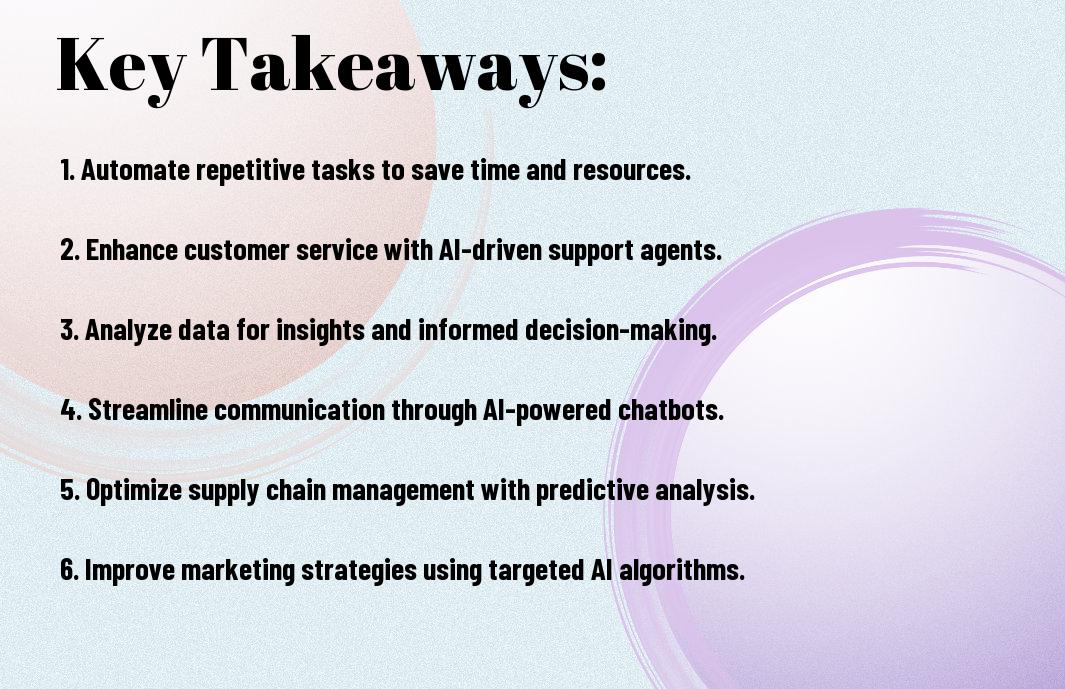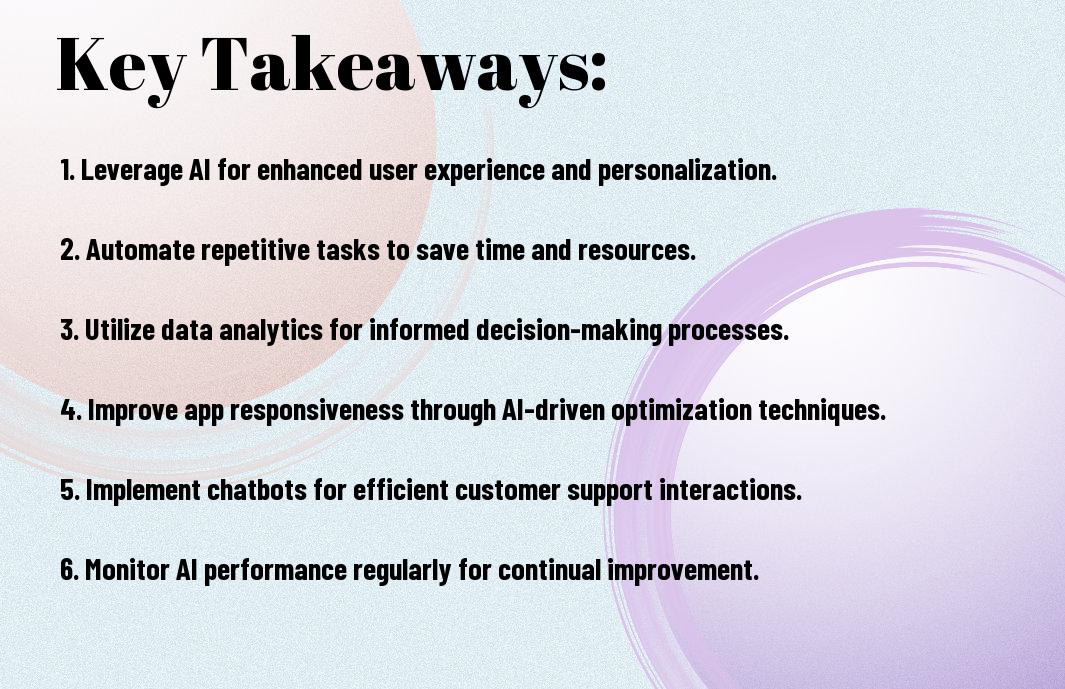You can significantly improve your business operations by leveraging AI agents, and this post will guide you through the process. As you explore ways to optimize your workflow, consider how AI technologies can enhance your efficiency. For more insights, visit How AI Technologies Streamline Business Operations to discover the potential of AI in transforming your business. By embracing AI, you can streamline your processes and take your business to the next level.
Key Takeaways:
- AI agents can automate repetitive tasks, freeing up human resources for more complex and strategic work, leading to increased productivity and efficiency in business operations.
- Implementing AI-powered chatbots and virtual assistants can enhance customer service by providing 24/7 support, answering frequent queries, and routing complex issues to human representatives.
- AI-driven process analysis can help identify bottlenecks and areas of inefficiency, allowing businesses to optimize their workflows, reduce costs, and improve overall performance.

The Evolution of AI in Business Operations
Before plunging into the ways AI agents can streamline your business processes, it’s important to understand how AI has transformed the landscape of business operations, enabling you to make informed decisions about implementing AI solutions in your organization.
Traditional vs AI-Enhanced Workflows
Besides the manual and time-consuming traditional workflows, you now have the option to adopt AI-enhanced workflows that can significantly improve your productivity and efficiency, allowing you to focus on high-value tasks that drive your business forward.
The Rise of Intelligent Automation
Alongside the advancements in technology, you are witnessing the rise of intelligent automation, which is revolutionizing the way you approach business process management, enabling you to automate repetitive tasks and make data-driven decisions with ease.
AI-enhanced automation is transforming your business operations by providing you with the ability to process large amounts of data, identify patterns, and make predictions, allowing you to optimize your workflows, reduce costs, and improve customer satisfaction, ultimately giving you a competitive edge in the market, and enabling you to achieve your business goals more efficiently.
Core Benefits of AI Agents
Some of the most significant advantages of implementing AI agents in your business include increased efficiency, enhanced customer experience, and improved decision-making. By automating routine tasks, you can free up resources and focus on high-value activities that drive growth and innovation.
Cost Reduction and Resource Optimization
Beneath the surface of your operations, AI agents can help you identify areas of inefficiency and optimize resource allocation, leading to significant cost savings and improved productivity. You can expect to see a reduction in labor costs, energy consumption, and other expenses, allowing you to allocate your budget more effectively.
Error Prevention and Quality Control
Alongside the benefits of automation, AI agents can also help you prevent errors and ensure high-quality output. You can rely on AI to detect anomalies, inconsistencies, and potential mistakes, enabling you to take corrective action before they impact your business.
Even more importantly, as you implement AI-powered quality control measures, you can expect to see a significant reduction in errors and an improvement in overall quality. This, in turn, can lead to increased customer satisfaction, improved brand reputation, and a competitive edge in your market, allowing you to achieve your business goals more effectively.
AI Implementation in Daily Operations
To integrate AI into your daily operations, you can start by identifying areas where automation can improve efficiency and productivity. This can include tasks such as data entry, bookkeeping, and scheduling, allowing your team to focus on higher-value tasks.
Customer Service and Support
Around the clock, your customers expect prompt and helpful support, which can be achieved with AI-powered chatbots and virtual assistants, enabling you to provide 24/7 support and improving your overall customer experience.
Data Analysis and Decision Making
For your business to stay competitive, you need to make data-driven decisions, and AI can help you analyze large amounts of data, identify patterns, and provide insights that inform your strategic decisions.
Even with the vast amounts of data available, you can use AI to uncover hidden trends and correlations, and make predictions about future market trends, allowing you to stay ahead of the competition and drive business growth, as you leverage AI to analyze your data and make informed decisions that drive your business forward.
Process Optimization Through AI
Unlike traditional methods, AI agents can analyze your business processes and identify areas of inefficiency, allowing you to streamline your operations and improve productivity. By leveraging AI, you can optimize your processes, reduce costs, and enhance customer satisfaction.
Workflow Automation
Along with AI agents, you can automate repetitive tasks, freeing up your team to focus on high-value activities. This enables you to increase efficiency, reduce errors, and improve overall workflow.
Task Prioritization Systems
At the heart of process optimization, AI-powered task prioritization systems help you focus on the most important tasks, ensuring you’re allocating your resources effectively. You can trust AI to analyze your tasks and prioritize them based on urgency and importance.
And as you implement task prioritization systems, you’ll notice a significant improvement in your team’s productivity and efficiency. You’ll be able to tackle complex tasks with ease, and your AI agent will continuously learn and adapt to your business needs, providing you with personalized recommendations to further optimize your processes.

Employee Collaboration with AI
Your business can benefit from AI agents that enhance collaboration among employees, you can learn more about How does AI agent development enhance business automation and efficiency to improve your workflow.
Training and Adaptation
Any organization can adapt AI agents to streamline processes, and you will find that training your employees to work with AI is relatively straightforward, allowing them to focus on high-priority tasks.
Productivity Enhancement
After implementing AI agents, you will notice a significant boost in productivity, as tasks are automated and your employees can focus on more complex and creative work, leading to better outcomes and increased job satisfaction.
Enhancement of productivity is a key benefit of AI agent implementation, as you will be able to automate repetitive tasks, freeing up your employees to focus on high-value tasks that drive business growth and innovation, allowing you to stay ahead of the competition and achieve your goals more efficiently.
Measuring AI Impact
Keep track of your AI agent’s performance to ensure it’s meeting your business needs. You can do this by monitoring key metrics and assessing the return on investment.
Performance Metrics
Monitoring your AI agent’s performance involves tracking metrics such as productivity, efficiency, and accuracy. You can use these metrics to identify areas for improvement and optimize your AI agent’s performance.
ROI Assessment
Across various industries, assessing the return on investment of your AI agent is vital to understanding its impact on your business. You can calculate the ROI by comparing the costs of implementing and maintaining the AI agent to the benefits it provides.
With a thorough ROI assessment, you can determine whether your AI agent is generating sufficient revenue and cost savings to justify its implementation. You can use this information to make informed decisions about your AI strategy and ensure that your AI agent is aligned with your business goals. By regularly assessing the ROI of your AI agent, you can identify opportunities to improve its performance and increase its value to your business.
Final Words
Ultimately, you now have the tools to revolutionize your business processes with AI agents. By implementing these 10 strategies, you can significantly enhance your operational efficiency. You will be able to automate tasks, optimize workflows, and make data-driven decisions, allowing your business to thrive in a competitive landscape. With AI agents, you can unlock new levels of productivity and take your business to the next level, achieving your goals and exceeding your expectations.
FAQ
Q: What are AI agents and how can they help my business?
A: AI agents are software programs that use artificial intelligence to automate and streamline business processes. They can help your business by taking over repetitive and mundane tasks, freeing up human resources for more strategic and creative work. With AI agents, you can improve efficiency, reduce errors, and increase productivity, leading to cost savings and improved customer satisfaction.
Q: How can AI agents improve customer service in my business?
A: AI agents can improve customer service by providing 24/7 support, answering frequent questions, and routing complex issues to human customer support agents. They can also help with chatbots, email support, and social media management, ensuring that customer inquiries are responded to promptly and efficiently. Additionally, AI agents can analyze customer data to provide personalized recommendations and offers, leading to improved customer engagement and loyalty.
Q: Can AI agents help with data analysis and decision-making in my business?
A: Yes, AI agents can help with data analysis and decision-making by processing large amounts of data, identifying patterns, and providing insights that can inform business decisions. They can analyze sales data, customer behavior, and market trends to provide recommendations on pricing, inventory management, and marketing strategies. AI agents can also help with predictive analytics, forecasting future trends and outcomes, and identifying potential risks and opportunities.
Q: How can AI agents streamline my business operations and workflows?
A: AI agents can streamline business operations and workflows by automating repetitive tasks, such as data entry, bookkeeping, and document management. They can also help with workflow management, assigning tasks, and tracking progress, ensuring that projects are completed on time and within budget. Additionally, AI agents can help with supply chain management, inventory management, and logistics, optimizing business processes and improving efficiency.
Q: How do I get started with implementing AI agents in my business?
A: To get started with implementing AI agents in your business, you should first identify areas where automation and streamlining can have the greatest impact. Then, you can research and select AI agent solutions that meet your business needs, and work with a developer or implementation partner to integrate the AI agents into your existing systems. You should also provide training and support to your employees to ensure a smooth transition and maximize the benefits of AI agents in your business.



